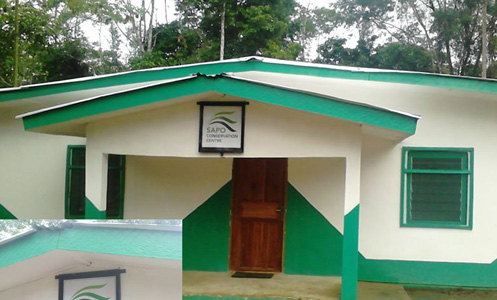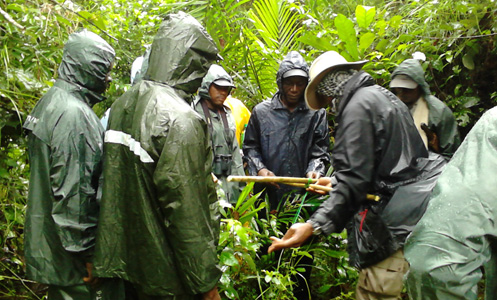ACT - Volume 9 Issue 1
The Importance of Sapo Conservation Centre for Conservation Studies in Liberia
By Mary Molokwu
Biodiversity in Liberia is part and parcel of its national reconstruction and development strategy which includes food security, alternate livelihoods, land reforms, and income equality. After 14 years of civil unrest which severely impacted its forests and natural resources, the call for increased capacity to conserve Liberia’s forests led to several initiatives. However, not much was known about Liberia’s biodiversity and for a long time no facilities existed to support scientists looking to advance knowledge in this all-encompassing endeavor.
 |
| A lecture hall at Sapo Conservation Centre, Liberia. Photo credit: SCC |
The Sapo Conservation Centre (SCC) was established in 2013, within the ambit of Fauna and Flora International’s (FFI) project 'Building Capacity of the Next Generation of Liberian Conservation Professionals' and it includes training, mentorship, internships, networking etc. which are made available to trainees from participating institutions. SCC serves as a base for training Liberian foresters, natural resource managers and biologists in conservation issues and ecological research, to improve local capacity in conservation and facilitate access to Liberia’s biodiversity and ecosystems for national and international researchers. Major stakeholders in the SCC include FFI in collaboration with Liberia’s Forestry Development Authority (FDA), University of Liberia (UL), Liberia’s Forestry Training Institute (FTI) and the Zoological Society of London (ZSL). Funding organizations are the the UK Darwin Initiative, US Fish and Wildlife Service’s (USFWS) Great Ape Fund, Basel Zoo, Arcus Foundation and the Global Trees Campaign.
 |
|
An SCC field exercise in Liberia. Photo credit: SCC |
Mary Molokwu is the Program Manager at the Sapo Conservation Center and the Technical Advisor Education & Outreach at Fauna and Flora International (FFI), Liberia.